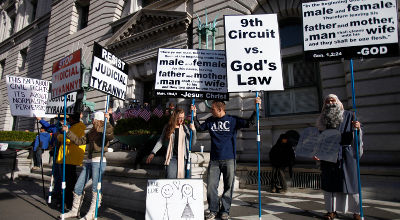Prop. 8 Defenders: Uphold Marriage, Let Public Decide
Defenders of California’s marriage amendment filed their opening brief with the U.S. Supreme Court Tuesday. The brief argues that the high court should affirm the validity and rational basis of the amendment and refuse demands for a judicially imposed end to the robust, ongoing public debate about marriage.
Alliance Defending Freedom attorneys are part of the legal team for ProtectMarriage.com, the banner organization for the official proponents and campaign committee of Proposition 8, which California voters approved in 2008. Last month, the Supreme Court agreed to review Hollingsworth v. Perry, the federal lawsuit attacking the amendment.
“Marriage between a man and a woman is a universal good that diverse cultures and faiths have honored throughout the history of Western Civilization,” said Senior Counsel Austin R. Nimocks. “Marriage isn’t merely a matter of personal preferences. How we treat marriage has societal consequences. The wisest course is for the court to resist demands to prematurely end the national debate over the future of marriage. Californians voted for marriage twice, and the court should respect the people’s freedom to affirm society’s fundamental building block.”
In February 2012, the U.S. Court of Appeals for the 9th Circuit declared the California marriage amendment unconstitutional. Voters submitted signed petitions to place the marriage protection amendment on the 2008 ballot prior to a California Supreme Court decision that redefined marriage in the state to include same-sex couples. More Californians voted on the amendment than for president of the United States.
“The Supreme Court has made clear that defining marriage as the union of one man and one woman is constitutional as a matter of public policy,” explained ProtectMarriage.com lead counsel Charles J. Cooper with the Cooper & Kirk law firm. “The lower courts rejected all relevant Supreme Court and appellate court precedent. We are confident that the Supreme Court will uphold its precedent and affirm California’s freedom to protect marriage.”
The opening brief in defense of the marriage amendment explains, “if it was reasonable for California to [uphold marriage] for 158 years before the California Supreme Court’s ruling in the Marriage Cases, it is also reasonable for California to draw the same line, for the same reasons, after the 142-day hiatus caused by that short-lived decision. And if it is rational for Congress and 40 other states to distinguish between opposite-sex couples and other types of relationships for purposes of marriage, surely it is rational for California to do so as well.”














































